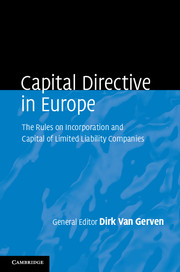Book contents
- Frontmatter
- Contents
- Contributors
- Preface
- Part I
- Part II National reports for the EU Member States
- 2 Austria
- 3 Belgium
- 4 Bulgaria
- 5 Cyprus
- 6 Czech Republic
- 7 Denmark
- 8 Estonia
- 9 Finland
- 10 France
- 11 Germany
- 12 Greece
- 13 Hungary
- 14 Ireland
- 15 Italy
- 16 Latvia
- 17 Lithuania
- 18 Luxembourg
- 19 Malta
- 20 The Netherlands
- 21 Poland
- 22 Portugal
- 23 Republic of Slovenia
- 24 Romania
- 25 Slovak Republic
- 26 Spain
- 27 Sweden
- 28 United Kingdom
- Part III Application in the EEA Member States
- Part IV Annexes
- Index
25 - Slovak Republic
from Part II - National reports for the EU Member States
Published online by Cambridge University Press: 05 June 2014
- Frontmatter
- Contents
- Contributors
- Preface
- Part I
- Part II National reports for the EU Member States
- 2 Austria
- 3 Belgium
- 4 Bulgaria
- 5 Cyprus
- 6 Czech Republic
- 7 Denmark
- 8 Estonia
- 9 Finland
- 10 France
- 11 Germany
- 12 Greece
- 13 Hungary
- 14 Ireland
- 15 Italy
- 16 Latvia
- 17 Lithuania
- 18 Luxembourg
- 19 Malta
- 20 The Netherlands
- 21 Poland
- 22 Portugal
- 23 Republic of Slovenia
- 24 Romania
- 25 Slovak Republic
- 26 Spain
- 27 Sweden
- 28 United Kingdom
- Part III Application in the EEA Member States
- Part IV Annexes
- Index
Summary
Implementation and scope
The Second Company Law Directive, as amended by Directive 92/101/EEC of 23 November 1992, was transposed into Slovak law by Act No 432/2004 Coll. amending and supplementing Act No 513/1991 Coll., the Commercial Code, as amended (the “Commercial Code” or “Com. Code”). The amendments introduced by Directive 2006/68/EC of 6 September 2006 were implemented by Act No 657/2007 Coll. amending and supplementing the Commercial Code, with effect as of 1 January 2008.
According to the reasoning report to Act No 657/2007 Coll., simplifying the regulation of public limited liability companies should have allowed the companies to react more flexibly and with lower expense to market development, which should have led to increased competitiveness, without reducing the level of protection of rights of shareholders and creditors.
The Slovak legislator decided to use the options to introduce exceptions from the duty to prepare an expert’s report on a contribution in kind, except for the case when the contribution in kind has the form of transferable securities, i.e., Slovak law does not allow the value of a contribution in kind formed of transferable securities to be established by the market value since the Slovak regulated market is not yet developed and, therefore, could not be considered a reliable source for the determination of the value of securities.
- Type
- Chapter
- Information
- Capital Directive in EuropeThe Rules on Incorporation and Capital of Limited Liability Companies, pp. 814 - 856Publisher: Cambridge University PressPrint publication year: 2014



